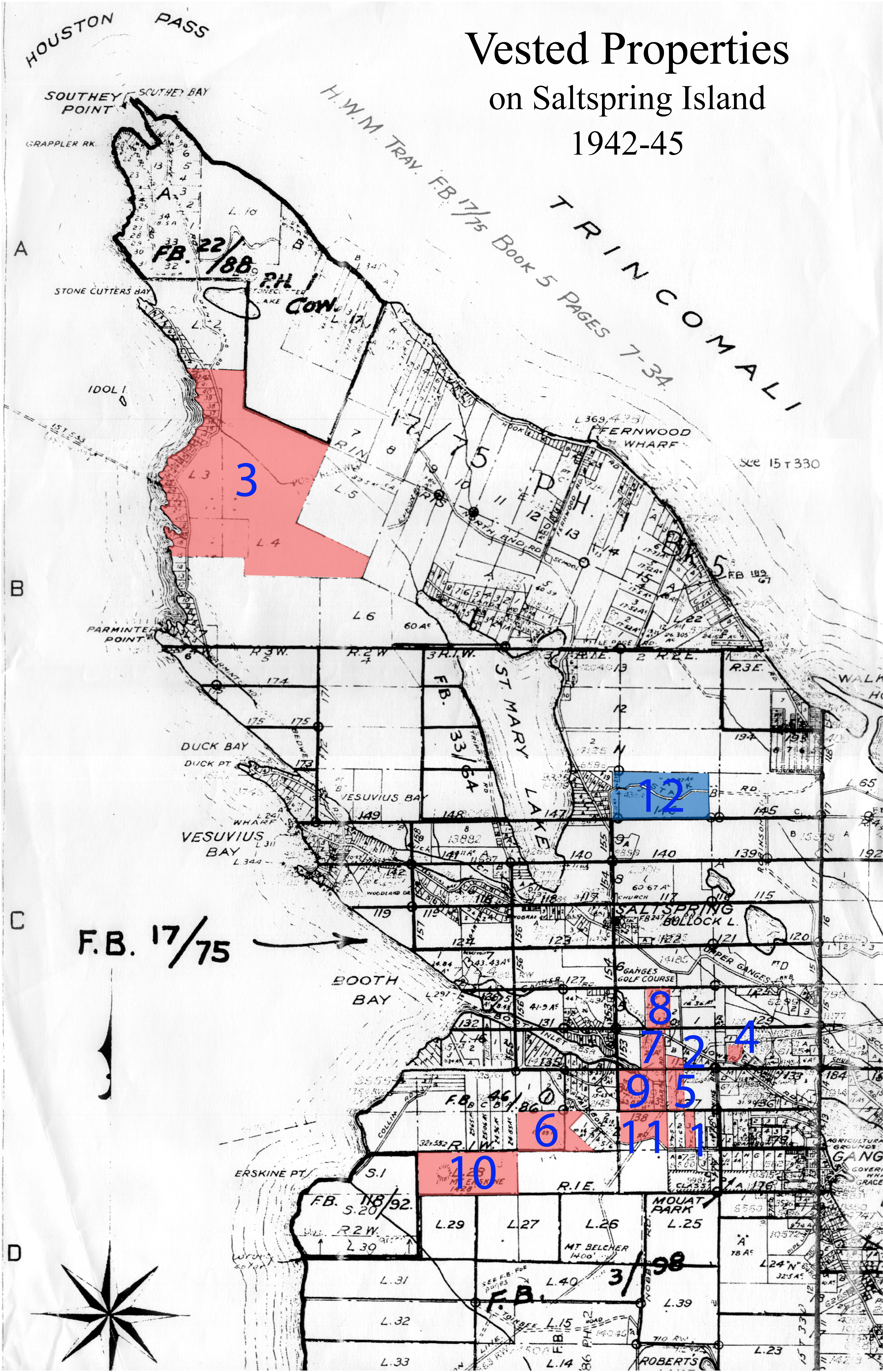
| Accession Number | a presentation to the Historical Society at Central Hall | ||
| Date | March 9, 2016 | ||
| Media | digital recording | Audio | mp3 √ |
| ID | duration | 90 min |
 Slide_3_Intro.png
Slide_3_Intro.png
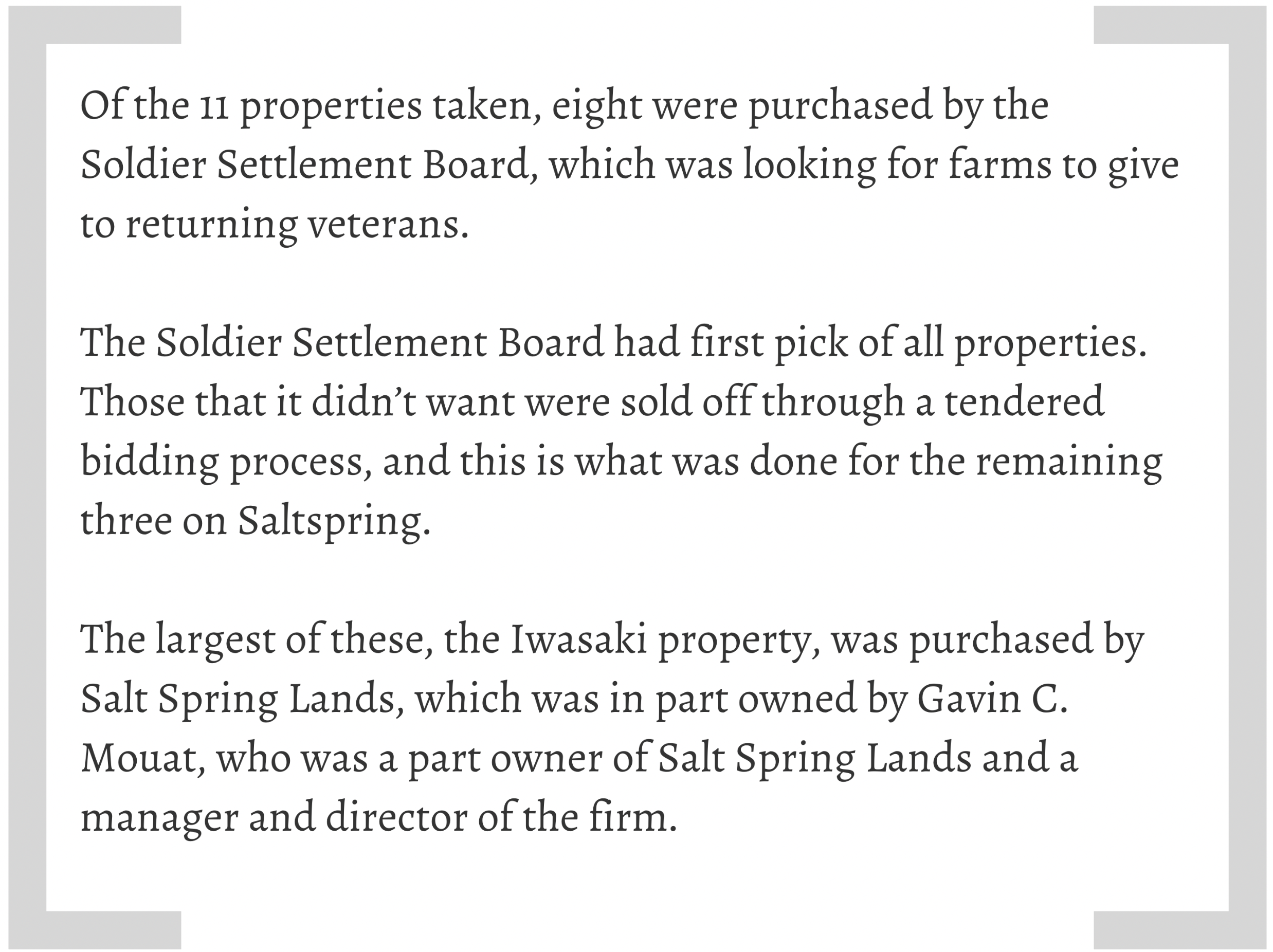 Slide_4_Intro.png
Slide_4_Intro.png
 Slide_5_Vested_Properities.jpg
Slide_5_Vested_Properities.jpg
 Slide_6_Vested_Key.png
Slide_6_Vested_Key.png
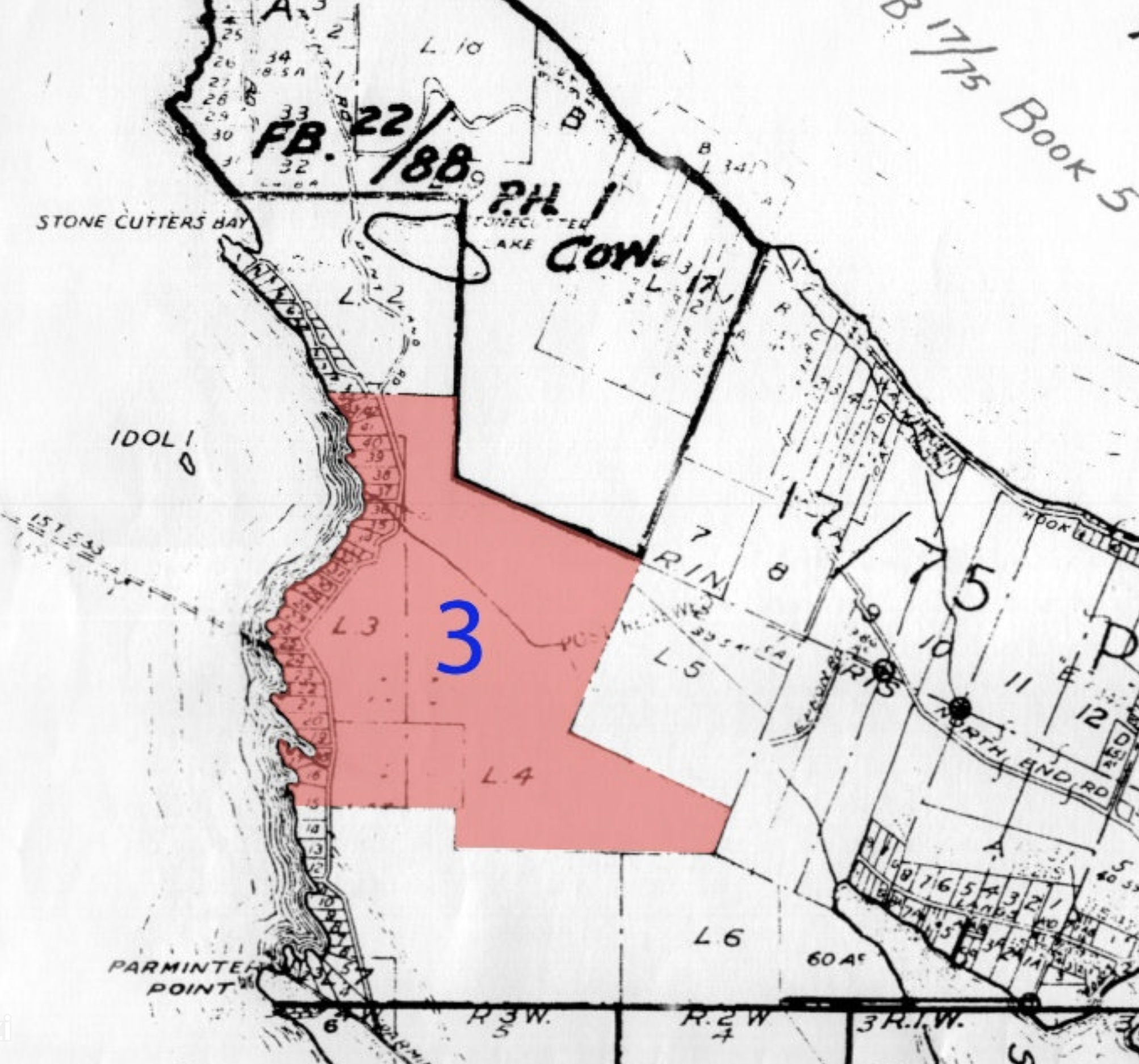 Slide_7_Iwasaki_Property.png
Slide_7_Iwasaki_Property.png
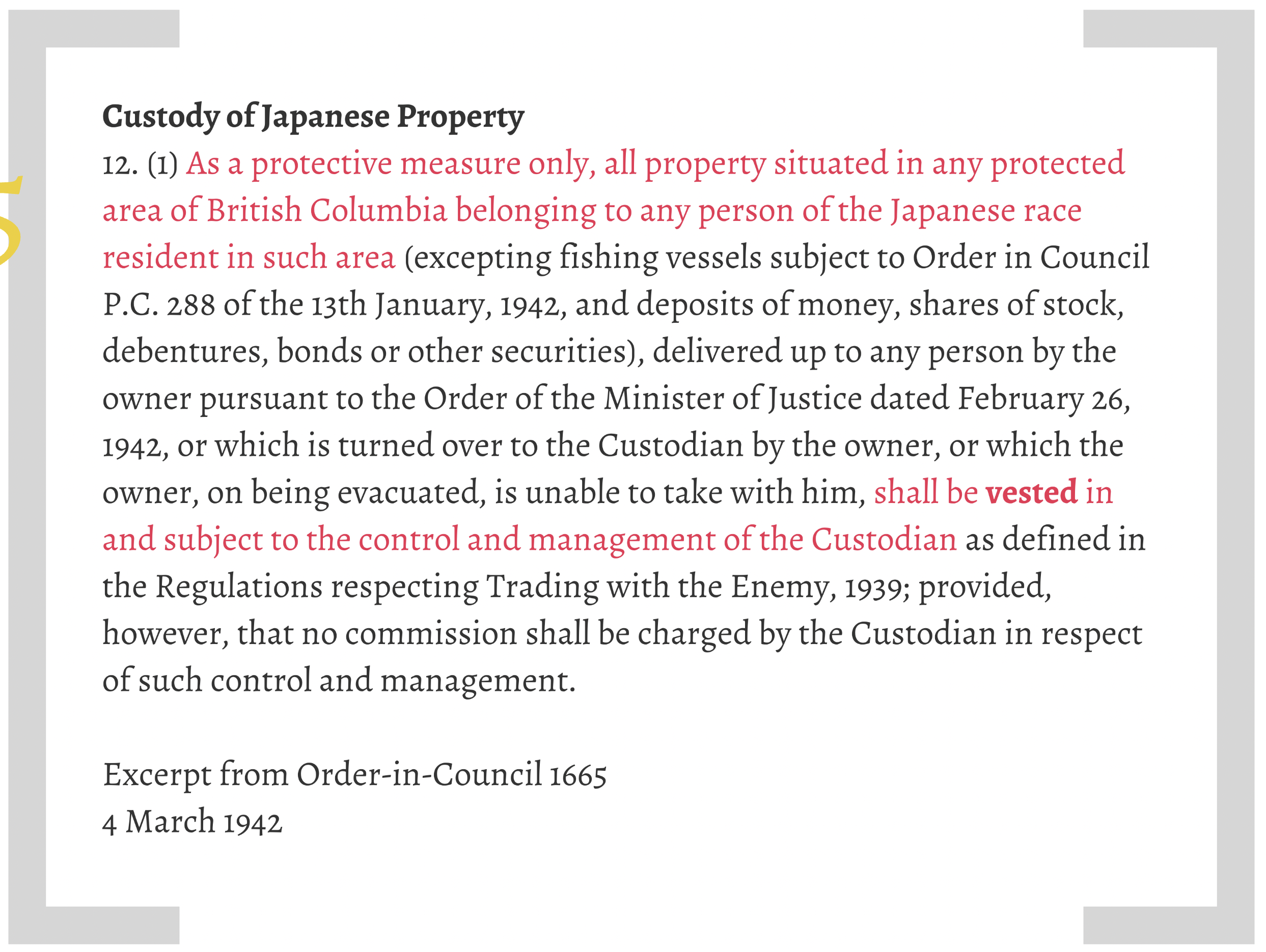 Slide_8_OIC_1665.png
Slide_8_OIC_1665.png
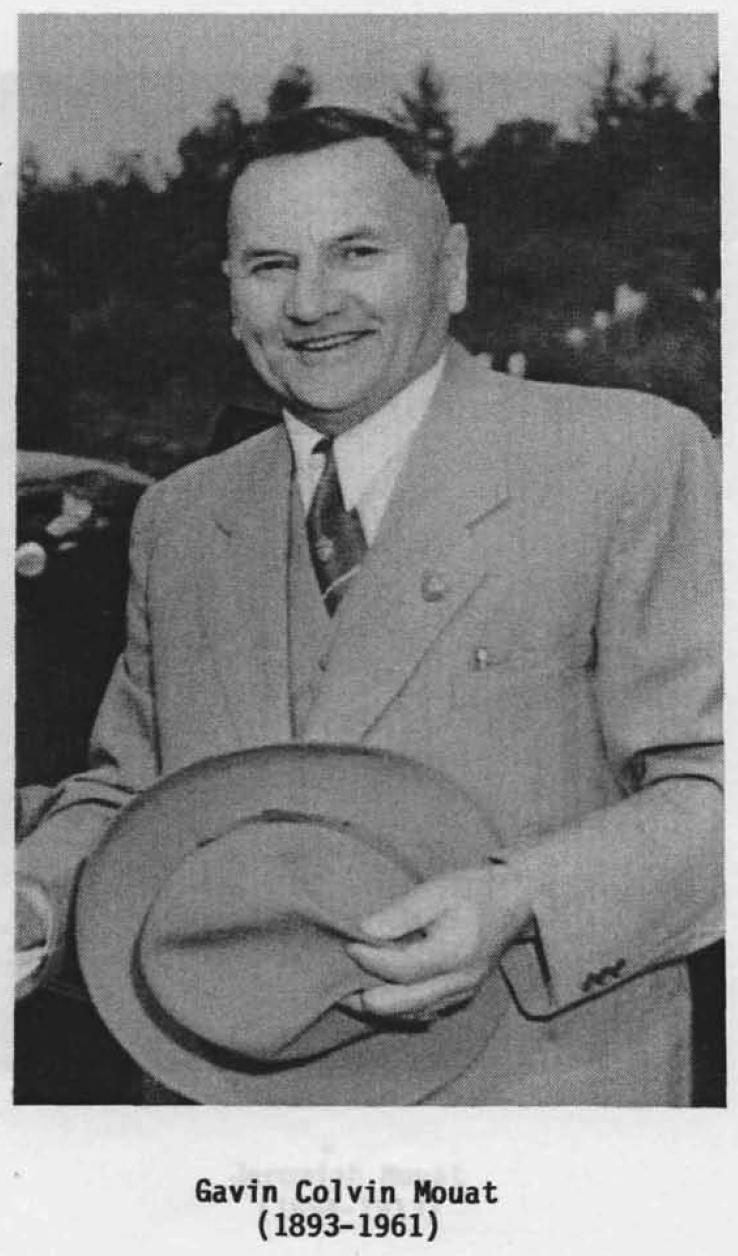 Slide_9_Gavin_Mouat.png
Slide_9_Gavin_Mouat.png
 Slide_10_Mouat_Compensation.jpg
Slide_10_Mouat_Compensation.jpg
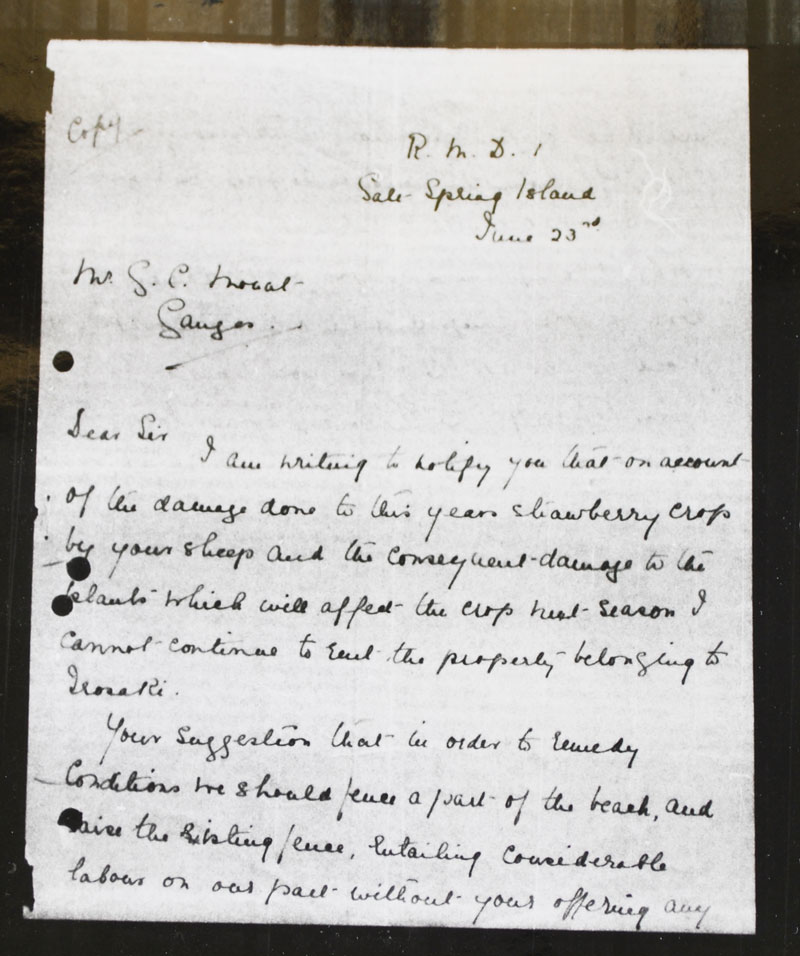 Slide_11aIwasaki-Rental-Letter-1.jpg
Slide_11aIwasaki-Rental-Letter-1.jpg
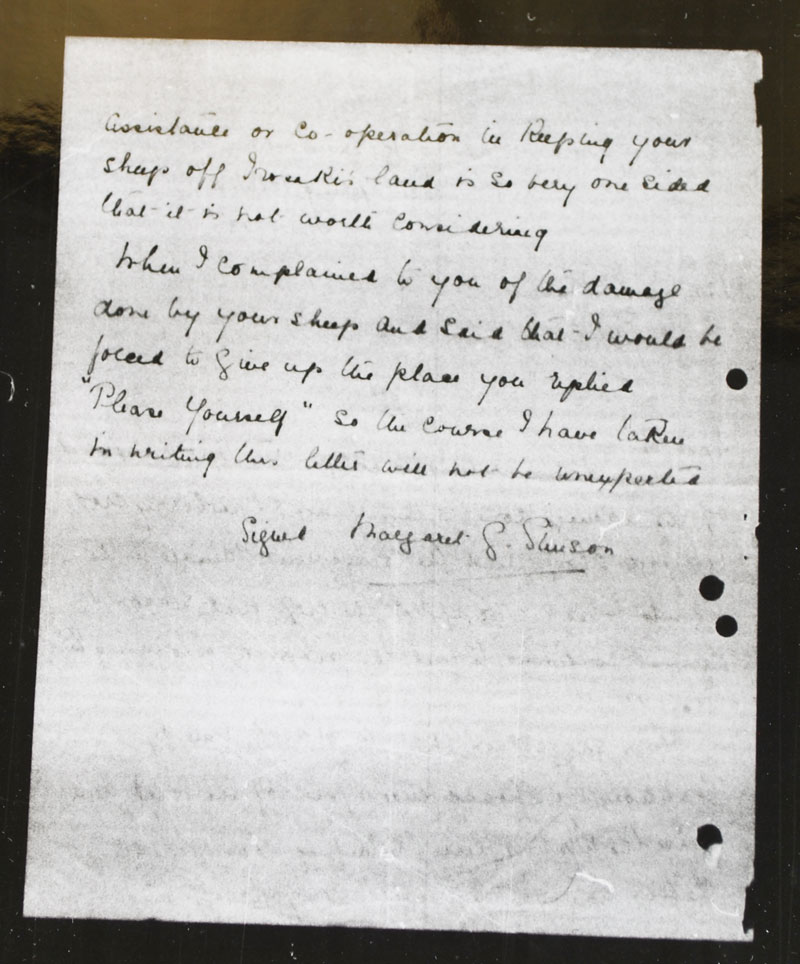 Slide_11b_Iwasaki-Rental-Letter-2.jpg
Slide_11b_Iwasaki-Rental-Letter-2.jpg
 Slide_12_OIC_469.png
Slide_12_OIC_469.png
 Slide_13_McPherson_Memo.jpg
Slide_13_McPherson_Memo.jpg
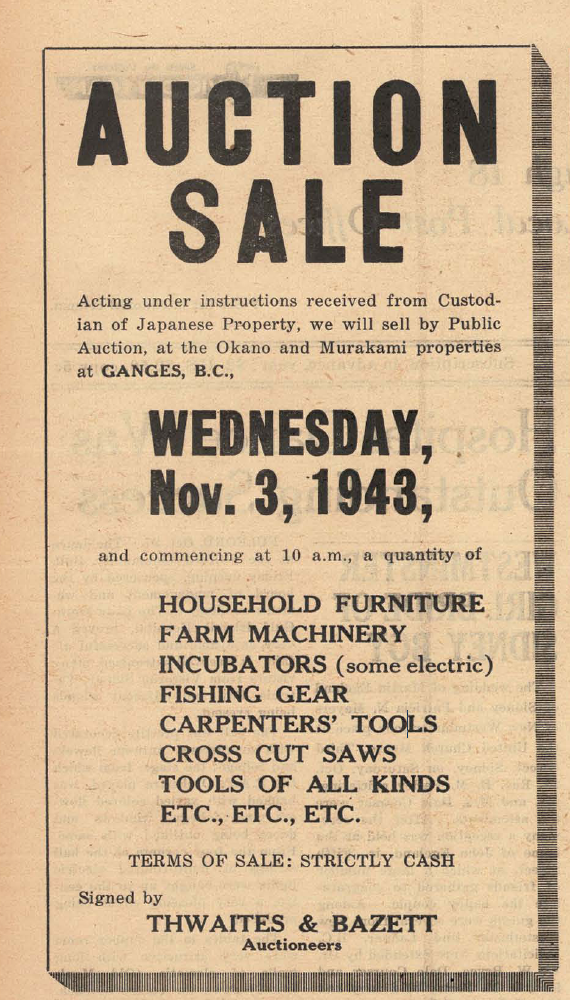 Slide_14_Ganges_Auction_Notice.png
Slide_14_Ganges_Auction_Notice.png
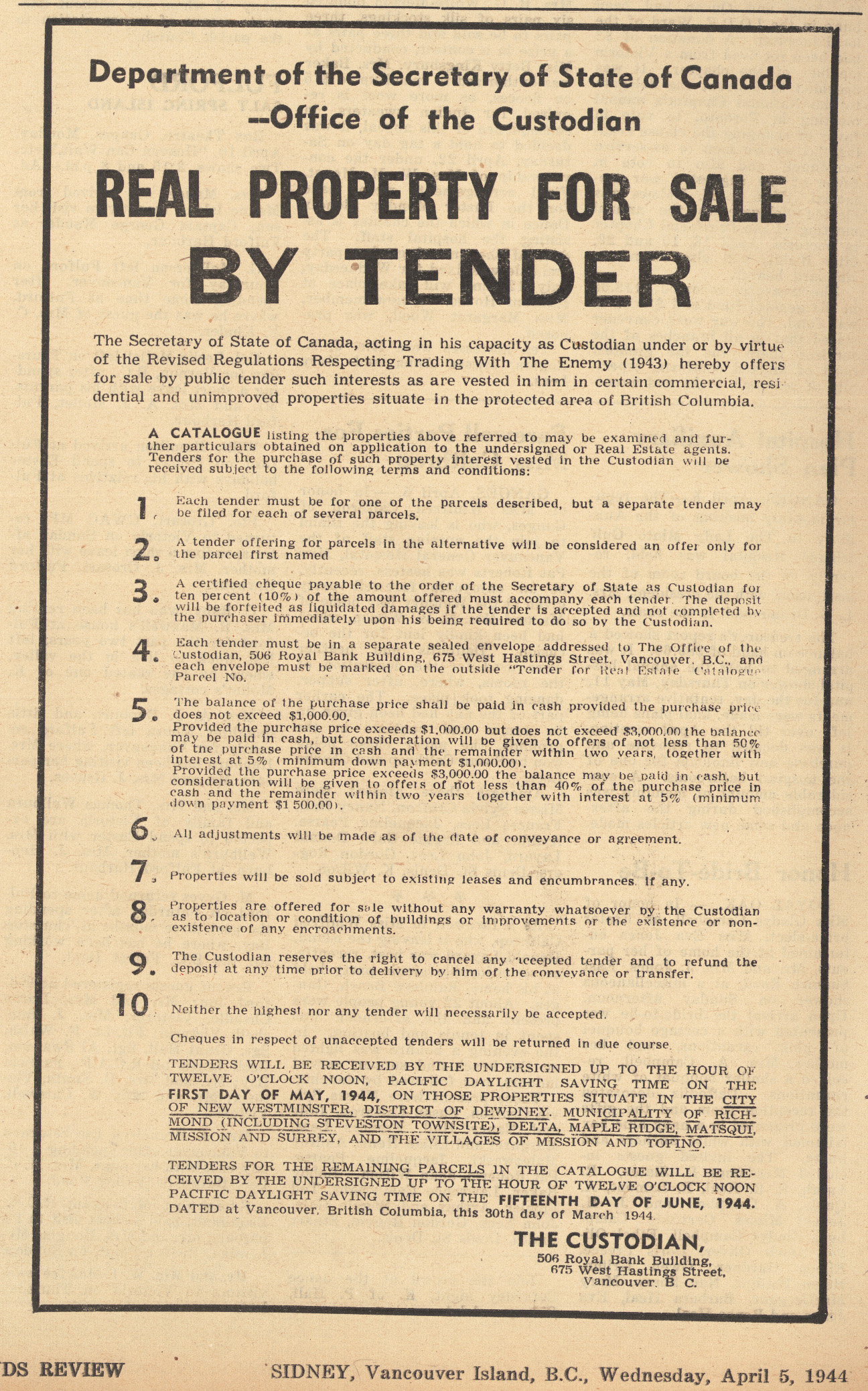 Slide_15_Notice-of-Sale.jpg
Slide_15_Notice-of-Sale.jpg
 Slide_16_Letter-to-DK-Wilson.jpg
Slide_16_Letter-to-DK-Wilson.jpg
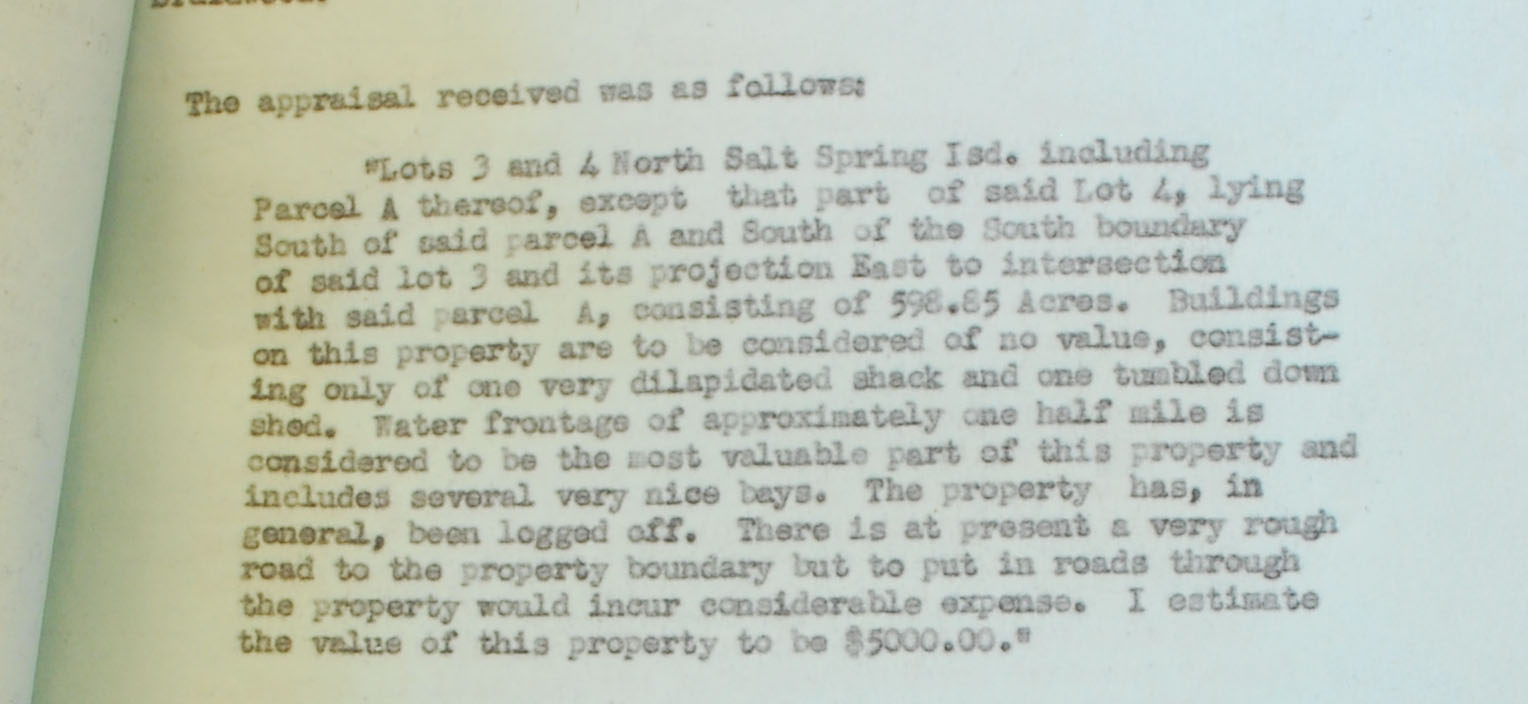 Slide_17_DK-Wilson-Appraisal.jpg
Slide_17_DK-Wilson-Appraisal.jpg
 Slide_18_DK-Wilson-Joins-SS-Lands.jpg
Slide_18_DK-Wilson-Joins-SS-Lands.jpg
 Slide_20_Gilbert-Mouat_Concerned-About-Legality-of-Sale.jpg
Slide_20_Gilbert-Mouat_Concerned-About-Legality-of-Sale.jpg
 Slide_21_Bird-Commission_Terms-of-Reference.jpg
Slide_21_Bird-Commission_Terms-of-Reference.jpg
 Slide_22_Bird-Extravagant-Claim.jpg
Slide_22_Bird-Extravagant-Claim.jpg
 Slide_23_Hall_Estimate-of-Remaining-Timber.jpg
Slide_23_Hall_Estimate-of-Remaining-Timber.jpg
 Slide_24_Hall_Estimate-of-Value-of-Timber.jpg
Slide_24_Hall_Estimate-of-Value-of-Timber.jpg
 Slide_25_Hall_Sale-of-Lots.jpg
Slide_25_Hall_Sale-of-Lots.jpg
 Slide_26_Registration-of-Napper-Lot.jpg
Slide_26_Registration-of-Napper-Lot.jpg
 Slide_27_Indenture-Lot-36-Guilbride.jpg
Slide_27_Indenture-Lot-36-Guilbride.jpg
 Slide_28_Hall-12K-Appraisal-Estimate.jpg
Slide_28_Hall-12K-Appraisal-Estimate.jpg
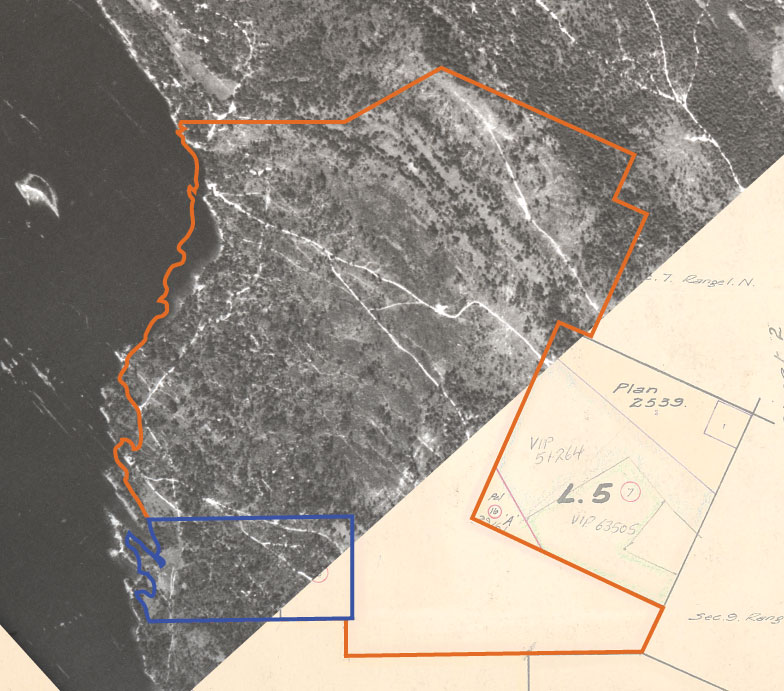 Slide_29_1950-Logging-Aerial-Photo.jpg
Slide_29_1950-Logging-Aerial-Photo.jpg
 Slide_30_VIP1300KP-1945-Logging-Aerial-Photo.jpg
Slide_30_VIP1300KP-1945-Logging-Aerial-Photo.jpg
 Slide_31_Cheque-Cover-Letter.jpg
Slide_31_Cheque-Cover-Letter.jpg
 Slide_32_Cancelled-Cheque-Original-Iwasaki-Sale.jpg
Slide_32_Cancelled-Cheque-Original-Iwasaki-Sale.jpg
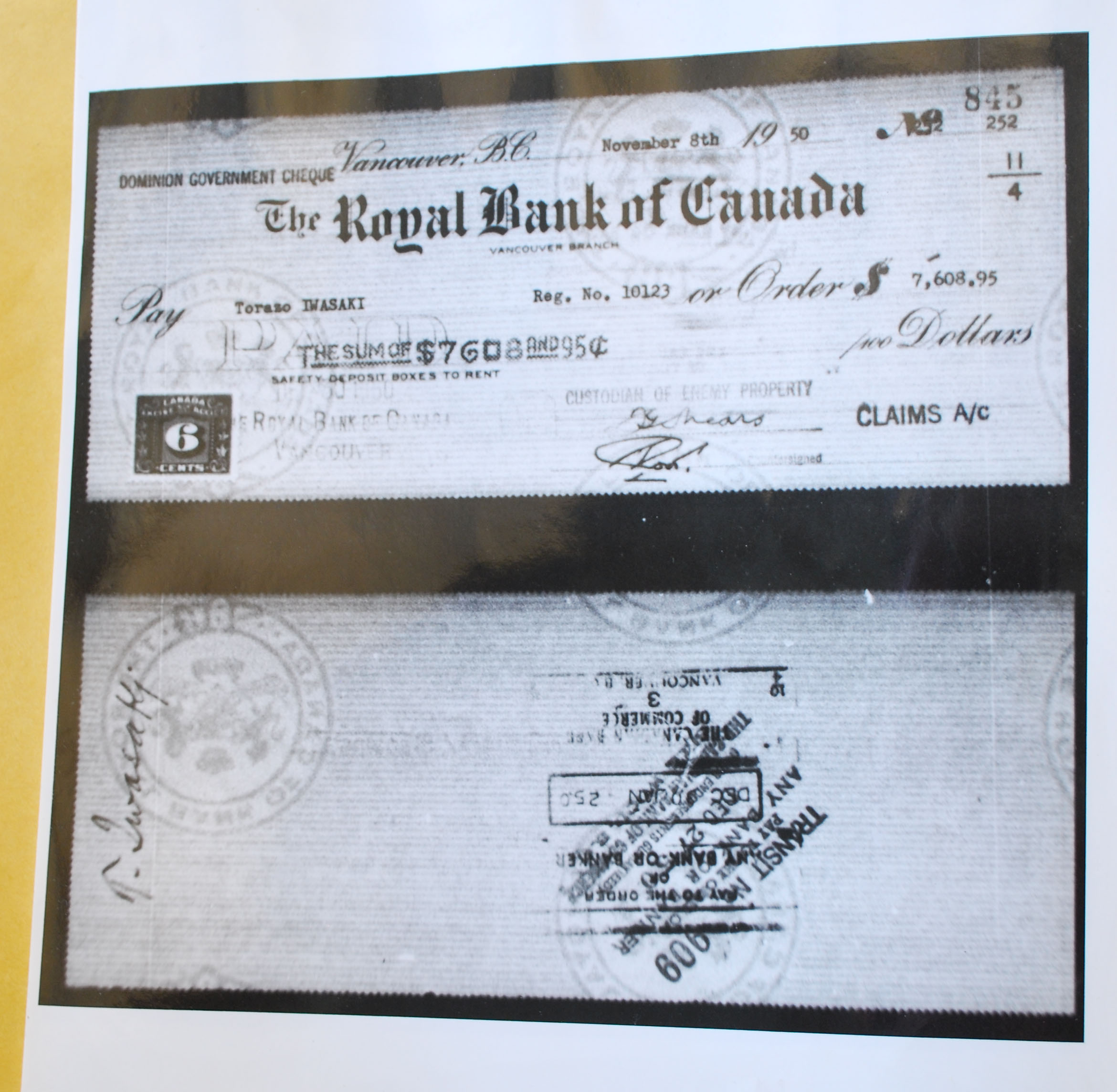 Slide_33_Bird-Commission-Cheque.jpg
Slide_33_Bird-Commission-Cheque.jpg
 Slide_34_Bird-Fair-Market-Value-Test.jpg
Slide_34_Bird-Fair-Market-Value-Test.jpg
 Slide_35_Iwasaki-vs-Queen.jpg
Slide_35_Iwasaki-vs-Queen.jpg
 Slide_36_Iwasaki-vs-Queen-excerpt.png
Slide_36_Iwasaki-vs-Queen-excerpt.png
 Slide_37_Japanese-Race-Ambiguous-newspaper-article.png
Slide_37_Japanese-Race-Ambiguous-newspaper-article.png
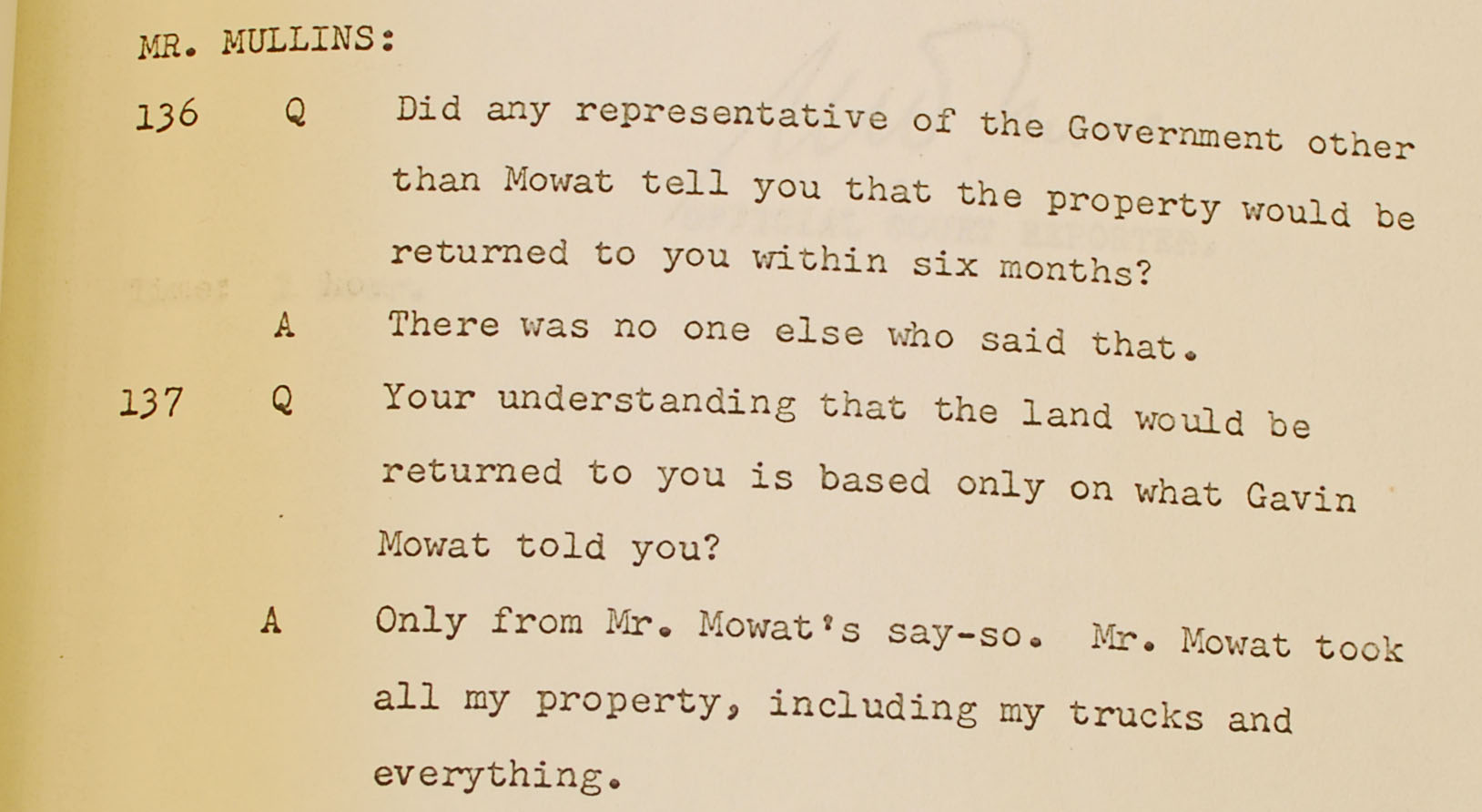 Slide_38_Gavin-Mouat-Part-of-Custodians-Office.jpg
Slide_38_Gavin-Mouat-Part-of-Custodians-Office.jpg
 Slide_39_Letterhead-Sec-State.jpg
Slide_39_Letterhead-Sec-State.jpg
 Slide_40_Macleans-Day-of-Infamy-article.jpg
Slide_40_Macleans-Day-of-Infamy-article.jpg
 Slide_41_Sheppard-Ruling.jpg
Slide_41_Sheppard-Ruling.jpg
 Slide_42_Sheppard-Ruling_Japanese-Race.jpg
Slide_42_Sheppard-Ruling_Japanese-Race.jpg
 Slide_43_Sheppard-Ruling_Conflict-of-Interest.jpg
Slide_43_Sheppard-Ruling_Conflict-of-Interest.jpg
 Slide_44_Supreme-Court_Ruling.jpg
Slide_44_Supreme-Court_Ruling.jpg
284_Smallshaw_Dispossession-of-Japanese-Canadian-Land_2016.mp3
otter.ai
19.04.2023
no
Speaker 1 0:00
I'd like to introduce you to Brian Smallshaw, who's going to make the presentation this afternoon. Ryan has lived in salt rented for the past 21 years, moved here from Tokyo, with his wife and his newborn son. He previously lived in Japan for 14 years where he completed a degree in sociology and political sciences, Sofia University, and a two year Japanese language course. After graduating, he ended trade magazine. And then he moved back to Canada and began importing Canadian made computers into Japan. And the business he was able to continue from home. More recently, and the reason he's here this afternoon is he has been studying history at the University of Victoria. And the material to be prevented presented today comes from his research for a master's thesis in the disposition of Japanese stadion lands during World War Two. And he might mention about the project he's working on, there's a series of people at the University of Victoria, who are doing a series of studies of the Oriental populations of Vancouver Island, there's about seven or eight of them, I believe, involved in the project. And our archives is part of that project with some of the resources. So some of the work you'll see today probably came from maybe some of our archive documentation. So Brian, welcome to historical society.
Speaker 2 1:40
I think, given the nature of my talk today, we should start out with by acknowledging that we stand on unceded territory of the book million people, it's particularly appropriate. I also understand that some of the material that I'll be covering today might be a bit sensitive. And I want it to be completely understood that if there's any bleed to be assigned from this story, that should first and foremost go towards the Canadian government. What routed the Japanese Canadian people sent them to the interior, and then took their land and sold it against their wishes. So that is, that should be understood from me the outset. In April 19 April 1942. During World War 277, Japanese Canadians were uprooted from Saltspring and moved to move to camps in the interior. Among them, they learned 11 properties on Saltspring Island. And these were vested with the custodian of enemy property whose agent on the island was Gavin see Mohammed, a member of a prominent Saltspring family and a leading businessman on the island, assured that their properties would be held by the custodian and 60 of keeping until they were able to return to the coast. Two years later, they were outraged to learn that their properties have been sold off at fire sale prices, despite their objections to defense the slide. And, actually the next slide, please. And the next one, please. So the properties that they own are shown here on this map in red. And you can see that most of them, I'll actually we have a pointer, I believe. So most of them are clustered around here around the end of booth canal. And then with a very large property in the north end, which was the Misaki property, which is the property we'll be talking about today. You'll also notice one other property here marks 12. That was the property that belonged to Myles Atchison, whose property was also dispossessed, just like the Japanese Canadian properties, because miles Atchison was resident in Japan controlled Shanghai at the time. And that's a whole other story that I'd like to tell you someday. It's it's a fascinating thing. But we won't have time to cover that today. But just for a bit of context, there was another property that was taken in addition to the Japanese Canadian properties. Next slide, please. So these were the owners of the properties. There were 12 different properties and they ranged quite a bit from five acres to all the way to the Misaki property 590 Pointing five acres and the size of that property is actually that's That's our best understanding of how big the property was. But figures have gone as high as 640. And the reason that they're it's kind of unclear is that on old property titles, the area of the property wasn't usually listed. So that's that's what we we best known to be the size of the property. So to give you all The next slide please. To give you sort of an overview of the whole story, and then I'll go into more detail into each of the steps that that occurred in the dispossession of this, this property here in the north end. So the property was dispossessed. The Japanese Canadians were resident in the interior, and in during 1942. The properties were held and were leased out, rented out and managed by, by the custodian. Starting in 1943, the government decided that it came to the decision to sell off the properties and there were that's a whole story in itself, as well, but they were having great difficulty in managing 1000s of properties, and especially the farming properties, which is any of us who have a garden No, you can't just sort of leave them and expect them to be beat okay, they really need to be actively managed. So properties were sold off. The Japanese Canadians were of course outraged at this they protested he was sacked, he posted protested vigorously read letters to the government was outraged at what happened. And then the war ended, and they were still not allowed to return to the coast until 1949. And in 1947, the government convened a royal commission to look into property loss claims among Japanese Japanese Canadians. It was headed by Justice Henry Berg, it would come to be known as a bird Commission. The Commission decided that the Iwasaki property was a special case, and I'll get into how they decided how to handle each of these properties. But they decided it was a special case and looked into it in more detail than most of the other Japanese Canadian properties that were sold and ended up awarding Iwasaki and additional approximately $7,000 on top of the $5,000 that he received during the war, for a total of $12,000. So he was lucky at first refused to cash the check. He in protest, he didn't believe that he'd be fairly compensated for his property. And, but finally, he did cash it. At about the time that the Royal Commission was being was being formed. he cashed the check, and cash the following check that gave him more composite compensation for the bird commission. Then in 1967, and quite a few years later, he was Sakhi, now in his late 80s brought a lawsuit against the Canadian government. He lost it was appeal went to the Supreme Court where he lost the game, and he ended up dying a bitter man. It's a very sad story. So how did this happen that a Canadian citizen could have his property taken from sold against his wishes. And given what many people even at the time agreed was pretty miserable compensation. Let's go into these steps in a little more detail and and see what we can learn. So next slide, please. Oh, actually, I think we need to. Yeah, so let's Yeah, let's sorry, for 116 65. So there were a number of orders and councils that were passed by the Privy Council, these were all done under the authority, the War Measures Act, which was in effect at the time, which gave the government basically unlimited power to do whatever it wanted. But it didn't follow a sequence of orders in council to provide a legal framework for what they were doing. Were in council 1665 was passed in in early March, which which called for the dispossession of the property. So it starts out, or well, this is an excerpt from it, but in Section 12 as a protective measure only and that that phrase would be important. Most people figured that this was being done for their own good that the property was going to be held in trust for them. All property situated in any protected area British Columbia belonging to any person of the Japanese race, resident in such an area and on non shall be vested in subject to the control and management of the custodian. So the land was taken from and at the time it was being done. Most people understood that to be for their benefit. And as far as the custodian was concerned, they also saw this as being important because this would allow the whole uprooting process to happen more smoothly. You can imagine that if it was understood by the people who were being uprooted, that their property was going to be taken from there would have been a lot of resistance. People would have fought back. But this at the time it was it was issue was bleep was was sort of served as a comfort to people actually, that their land would be taken care of. And of course, that's not exactly how it worked. The other thing I should draw your attention to is the word bested. This is important. Vesting, in a lot of people's minds meant that the land was being held in trust, in fact that it was being held for safekeeping. Legally, that's not what the word message means at all. That's the means given over Absolutely. Completely, without restrictions. And that's exactly what happened. Next slide.
Speaker 2 10:43
So, they were overnight, the custodian was faced with the need to manage all these properties, hundreds and hundreds and hundreds of farms, especially, they also had major urban properties in the Lower Mainland, but the farms of the Fraser Valley, around 800 Farms needed to be managed. And not only did they need to be managed, they that the output from these farms was important. World War Two is going the output of those farms, especially the chicken farms that existed so many of the Japanese Canadians had chicken and egg farm operations. And then they also had dairy operations. Those were the big, big things they were involved in. But particularly chicken operations were very important for the world. This was food that the country needed, needed to export, and they needed to manage them. So suddenly, they were they had the custodian had this huge task thrust upon them to manage all these farms. And they did it directly. And then they and they, they hired hired people to help them. And they did as much as possible they leased the moat and rented them out to people. In the Gulf Islands, their agent was Guatemalan. And they chose Gavin, because he was he was kind of a natural choice for the, the position he was well known on the island. He ran a Land Company. He knew everybody he was he was generally very well, well, well thought up. So they chose him for the job. Next slide, please. So got a mo was paid a salary for his work, at least in 1942. I haven't, I haven't really been able to find financial records beyond 42. But at least in 1942, he earned a salary of about $1,269, which was pretty good money at the time, enough to buy a Ford from the dealership that he had here on Saltspring. And this comes from a later later report that was compiled during the bird commission in 49. That some people thought that apparently that he was he was he was a good employee of the custodian of enemy property. Others weren't quite so quick. So sure. So this was this was both of these reports were typed out by Gavin or I plan Glen McPherson who was the deputy custodian at the time. Next slide. So on the on the island, this looks like it's just about impossible to read. But on the island, Gavin Mowat rented out, the properties looked after them. And on the Iwasaki property, we there was a person who stepped forward and said that they wanted to rent the garden that he had had going. He was he was a farmer, a gardener and also graced the great cheap and as well as logging on his property, and Margaret Simpson stepped forward and said that she wanted to rent the garden space. And she did for a couple of months, and then quit, resigned in protest because apparently gathered moments sheep, were getting into her garden and destroying her crops. So she, she stopped renting the property. And after that, it mostly seems like it wasn't used and unfortunately, a lot of the equipment that was on the house and the the logging equipment that was on the property was quickly stolen and vandalized and and very shortly was reduced to wreckage by the sounds of it. Next slide, please. So then, by the end of 42, it was a very hard year for the custodian looking after all of these properties. They were they were really having a lot of trouble with it. And by the end of the year, like person who ran the ran the custodians office was was He was the Assistant Deputy customer or the deputy custodian, and was shuttling back and forth between Ottawa and Vancouver. He was coming to the conclusion and it was primarily his his decision that, that really maybe the best thing would be for the property to be liquidated. And this was there's a real processing coming to this decision and and we can't go into too much into too much detail here. But early 43 An order in council was passed, which basically gave the custodian the authority to sell off all the property. So, the evacuation as this this is, this is the word that was usually used for the uprooting was evacuation, sort of suggesting that it was, again for the benefit of Japanese Canadians. It had been completed and that now, given that the custodian had the power had been vested with the power and responsibility of controlling and managing any property of persons of the Japanese race evacuated from the protected areas, such power and responsibility shall be deemed to include into included from the date of vesting of such property and the coast custodian, the power to liquidate, sell or otherwise dispose of such property. And so it was beginning of 1943. But that gave them the power but they even at that point, they still weren't completely convinced that that was the best course of action, but they they now have the power to do it. Next slide. So at this point, they had the the they formed a couple of advisory committees to try and figure out exactly how to do all of this. And there was a rural advisory committee in a in an urban one. And each of those actually had a Japanese Canadian representative. But as they were early, or fairly early in the year, the Japanese Canadian representative on the on the rural committee, yes, Tara Yamaga. he resided in May. And the representative on the urban committee, quiches, oh Kimora, he resigned in July, when they really quickly saw that what was going on, they were they were drafted into these advisory committees. And then it was becoming clear to them that what was really going to gonna happen here was all the properties were going to be sold off. But even in May, if you if you read this, it is not this is this is Glenn McPherson, the deputy custodian writing to shears, who was the director of Vancouver office, he's still not completely sure that that liquidation of the property is the right way to go. But they're there, they're leaning a lot closer to it. And then, if you could do this, then in in June, they, they decided they are going to sell off a large block of properties. Actually, this is slides a bit early, they're going to sell off a large block of properties to the soldier settlement board. So right from the beginning of the vesting of these properties, the soldier settlement board was brought in, and the soldier settlement board was a government agency that had been formed under the Veterans Land Act, in order to provide land for returning veterans. So they knew when the when the war was over, they were going to have a huge return of veterans coming back to Canada who were bringing something to do. And as they had done after the First World War, they wanted to provide properties to these people so that they would be able to take up farming and and work on the and that's something to do. And so the soldier settlement board was given the power basically to look at all land sales, all sales of Japanese Canadian land before they happen. And it's in a sense, sort of like veto power. They they can if, if their property was going to be sold, they basically had sort of first dibs on and there was negotiation going on and with the soldier settlement board and to to purchase a large block of properties. And that's eventually what happened. They bought close to 800 properties in a single block 769 properties in a single block for $850,000. And most of these properties were lost, follow them actually were in the Fraser Valley. So it was a huge block of farms in the Fraser Valley. These were purchased and that was the first block of sales then that happened in in June 43 and And then they started looking at the, at the other properties outside of the Fraser Valley. And so they while they were negotiating for other properties, they started selling off the property. The not the real estate, the things that were on the on the properties in the Gulf Islands. And here's a notice for an auction sale, it happened in October of 43. For for material off the off the properties.
Speaker 2 20:33
So they came to they came to a deal where they they paid the veteran under the veterans and blacklist act, they paid $35,000 for another 33 properties that were situated on, on Vancouver Island in the Gulf Islands. And they ended up actually the deal close for $30,542 98% of the appraised value. And of course
Speaker 3 21:04
that sign there that says the old candle and grandfather.
Speaker 2 21:13
That That's right. Yeah. Yeah. And interestingly, a little thing that I noticed about this that was kind of interesting to it was by off Island, auctioneer's tweets and Bassick were leaked from Duncan. And I thought that was kind of interesting, because Saltspring land, who was actually managing the sale, regularly conducted their own auctions on the island all the time, not unrelated to the Japanese Canadian land question. They held auctions all the time. But they didn't hold this one, which was kind of curious
Speaker 2 21:54
to hear what the so this auction here that happened on Saltspring, in October 43, was was carried out by off Island auction years that this, this auction happened on the Oconto. And we're economy properties. So my grandfather, roses, grandfather's property is where this where this auction was held. And it was. So next slide. Then in in 44, the 44, the Fraser Valley properties have already been sold. Now they're moving into selling off the the the properties on the on the Gulf Islands, and here's a notice, for sale by tender. The properties were that were here, and it's too, too small to see. But the closing date, I believe, was June 15 1944, to receive tenders. And then they would take classes and sell off all the properties. So the of the 11 properties that were sold on Saltspring. Eight of them went to the soldier settled before they'd already been sold. The remaining three properties came under this sale right here, the sale by tender. So there were three remaining of those, one of them was the Misaki property. And so they accepted tender bids until the 15th of June and they received three. They actually mentioned the properties that were the remaining three were owned by Nakasone Ito Masayoshi Murakami and terrazzo Iwasaki. And so they set the business over 50 and received three for the USIP property one came from George Bush of Vancouver. Another came from and that was for $2,500 and other was for 4250 from a captain am Smith of the maples on Saltspring. I don't know if anybody knows anything about him. I don't I would like to know more. And the third one for forehead 4550 came from Saltspring lens, which of course was Gavin Well, it's coming as part of this process because sodium decided that it needed to make an appraisal of the properties before it accepted any of these tender bids. And so but they still, after a month after the closing of bids, they still hadn't conducted this appraisal, for whatever reason it hadn't been done. And they read to August. And they were clearly if you if you read the correspondence, they were kind of scrambling. They didn't really know what to do when they finally they finally found because Gavin law was disqualified from doing this because he was both the agent of the custodian and his company had made a bid on it. If they if you didn't ask them why they finally found somebody through a contact in Victoria, they they found Mr. DK Wilson on the island. And they had wrote to him in August, August 3 44. So this is getting on to two months after the close of bids, and they still haven't gotten an appraisal on these properties, which is kind of strange. They phoned Mr. Wilson and this this was the this is a copy of the follow up letter, we confirm the arrangement stayed with you this afternoon by telephone to appraise the properties listed under numbers 551-552-1553 in our catalogue of properties recently advertised for sale, as explained to you and let's have a proper independent appraisal of each property in the catalog. Mr. Gavin C mode is representative for Saltspring main islands, and consequently, is de barred from doing this work for us in that area. We telephoned you after consulting our Victorian agents, we shall arrange look forward to your report at the beginning of next week. So as it happened, August 3 was a Thursday, and he delivered his his appraisal on Monday. So it was kind of a rush job. If you didn't advance the slide. And this was the some of the appraisal, this was all in one paragraph. About half of the paragraph is the legal description of the of the property. It's actually only five sentences long. And as an appraisal goes, it's pretty poor word. He goes, the list this size of buildings in this property are to be considered of no value consisting only a very dilapidated shack and one coming down and shed Well, by that point they were they've been vandalized for a couple of years, most of the property being sold waterfrontage of approximately one half mile is considered to be the most valuable part of this property includes several very nice base. Well, yes, but he actually got it wrong by above. He's about a third of what it actually is. It's more like a mile and a half not a mile half a mile. The property has in general been logged off? Well, no, actually, it hadn't been mostly logged off. And it's been about a third logged off. According to the government, timber scalars, who, who conducted timber cruises on the property and and knew how much how much how many trees were there. This was information that was available to them to there is a present a very rough road to the property boundary, but But putting roads to the property would incur considerable expense. Well, that's probably true. I estimate the value of this property to be $5,000. Nice round number, not very high. And that's that was the that was the deed Keith Wilson appraisal that happened in 44. Next slide. So who was Viki Wilson? Well, I looked into this a little bit because the appraisal seemed a little bit. Well, poorly done a bit fishy. And I found this little announcement. Being the sort who reads old newspapers, I found this announcement from 1938 in the Saanich Peninsula and Gulf Islands review. Next slide, please. We can zoom in there. And it turns out Mr. Keith Wilson actually worked for South spring land. At least in 1938, what his status with the company was in 1944 45. I don't know. But he was at least previously an employee of Saltspring land. He wasn't he was a ladder. Is that right? Well, he also owned the Vesuvius in at one point, but so as far as being an independent neutral appraisal, I don't think this house
Speaker 2 29:09
so we don't really know what his current status wasn't at the time of the time of the purchase. But immediately after receiving the appraisal, the custodians office writes to the two highest bidders, who are Saltspring lands and Captain Smith of the maples. And since that they want to entertain any bids that are under $5,000, so the previous bids that they'd given 40 to 50 and 4550 wouldn't wouldn't apply and tap and sit increases his offer to $5,000. Gilbert Malloy writes a letter in which he says we are willing to make a higher offer but we do not want to make offers just for the purpose of getting the place out for someone else. And then they offer $5,250. And that offer is accepted. Now, we don't also don't know what kind of communication was going on between Saltspring lands Gilbert and Gavin and the custodians office in Vancouver. The considering Gavin at that point was still the agent of the custodian, and we have to assume that there was at least some conversations going on about the sale or not, we have no way of confirming. So if you so they would send in a deposit cheque of $2,000. And with a cover letter, and the cover letter contains a very interesting sentence at the end. And it's should be noted that the cover letter came from Gilbert, not Gavin. We want to clearly understood also that in the event of any court decision making sales of these lands illegal, any songs that we have paid will be returned to us, please confirm and oblige. So this sort of suggests to me that they understood that this was kind of a dodgy transaction, that maybe this actually wouldn't really fly that it was, could possibly be overturned. It could be it could be, could be bullied, and they knew about that. And they were concerned that they could get their deposit back. So the sale goes through the transfer, the title isn't transferred right away, because there's an encumbrance on the property from glenlake login, when like logging had been given I had had come to a timber agreement with you Misaki before before the word restart. And, and that agreement called for glenlake logging to log the property and pay $2 per 1000 board feet in sumbitch. Two to teach the sacrum. So they find what they're going through the records. They're trying to resolve this encumbrance on the title the timber license with lenalee, blogging and they find it it during the war. Zaki has only received one check for $260 in stumpage fees. But to the best of their understanding, he was actually owed $2,754.83 and stumpage. Nobody can figure out what happened to the other the other money the approximately $2,500. He was supposed to be owed something. And from what I understand that was never resolved. That was just floating. He was owed salvage. It never never got paid,
Unknown Speaker 32:54
who was keeping the books and
Speaker 2 32:57
the books were being kept like when Lake logging. And when they were looking into it, there was a lot of back and forth. lawyers were talking to lawyers. They were trying to find it and it seems that by 1945, literally blogging and more or less ceased to exist. It was not working on the island anymore. It was a little operation. It sounds like you know, there were discussions like we think maybe or I can't remember what the name was. We think somebody's got it in their drawer. But we're not sure there was a lot, a lot of communication that really didn't amount to a real conclusive things, but we don't we know that he was like he received two $60 the rest of the money is unaccounted for,
Unknown Speaker 33:37
because that was in the books.
Speaker 2 33:43
So according to the timber cruises, glenlake logging took out about 1.3 million board feet off the property at a rate of $2 per 1000 and government timber scalers estimated that there were a total of 4 million board feet on the property. Those numbers come from before the war, they ran to timber cruisers, as the government did determine how much how many how much lumber was on property. And they figured ballpark was a 4 million on the property glenlake took out about 1.3 million. So at this point, when the sale is going through, when they're trying to resolve titles, you can't you can't help wondering if when they see that he was Saki had had supposed to have received $2,700 In stomping at a very low rate for some $2 per 1000. By 1945. The going rate apparently was $4 $2,700 and some things that he was are $2,500. He was owed in stumpage and they just sold the property off a $5,000.50 to 50. They kind of wonder if at that point already, they might might have been thinking that they've kind of made a ghastly mistake. But anyway, over the next few years, he was signing letters in protest, flatly refused to forward the certificate of title for the property, they were actually asking him to simple the title to the property to pass on to the new owners. And you especially for some reason, didn't want to do this. And and so there it sat in 1947. There came to be an acknowledgement, a widespread acknowledgement that the Japanese Canadians did not receive fair compensation for the property during the war. And that, that they needed to look into this and see if they can resolve it. And they can be the royal commission that came to be known. I can't remember what its full proper name is, but it seems to be widely known as the bird commission, because it was chaired by Justice Henry bird. And so the bird commission started out in 1947. And, and, actually, already, yes, they were there. And so the bird commission, its Financial Terms of Reference were were quite broad. They were brought down to, to looking at strictly looking at property claims. No other claims for losses would be entertained. And then they they realized that it quickly became apparent to both the bird Commission and the cooperative committee on Japanese Canadians that trying to come up with a fair settlement for each of the several 1000 properties would be just a mammoth task. And the Japanese Canadians themselves realize that if they were going to try and work out every single property that this would take many, many years that it was, it was going to be a huge, huge task. And so they decided that they would try to come up with some kind of compensation for me. And this, this formula would be like a percentage based on what they've received during the war. So in addition to that, they would receive extra compensation. On top of what they received during the war, they divided the properties up into urban and rural, to come up with a separate round in each of those for the urban properties, mostly in the Lower Mainland, they decided that the appraisals were more or less correct. This is a hugely debatable back that that's what they decided at the time. And that the people who had lost property in the Lower Mainland would receive the expenses that had been deducted from the sales during the war. So in many cases, what happened is as the properties were sold for a price, and then all of these deductions were taken off for real estate agents and taxes owing and this and that, to the point where they received almost nothing. And so those were compensation for those was made for the urban properties. The rural properties were handled differently, they acknowledged that the appraisals on the urban rural properties had been a lot weaker than the urban properties. There's all sorts of stuff about how a lot of the appraisers didn't come from the Fraser Valley, even some of them were brought in from the prairies, they had no real idea what what properties were worth. It was also during the Second World War, and so trying to come up with an accurate appraisal during the war is pretty hard, because it's obviously not normal conditions. And so, but anyway, they came up, they decided for the rural properties under the bird commission that all of them would receive an additional 80% on top of what they have received during the war, and all the expenses would be paid back. And that would be that would apply to the vast majority of those properties. They did acknowledge, however, that there would be some exceptions. So some properties, they just saw that formula just really wasn't appropriate wouldn't work. And they decided that those would be those, in fact, would be looked into in more detail on a case by case basis. He was lucky property was one of those. And so it was it was examined in much more detail, which also makes it very interesting if you're looking at trying to understand the whole process. By reading reading Iwasaki story, you get a deeper understanding of how the whole thing went down. So, the commission to determine whether that claim falls within a particular category, whereas special features requiring consideration by the conditioner. The claim so found to fall within a particular category shall be determined upon the basis of the conclusions there's for reached by the commissioner in respect of that category and claim so far to have a special features and not fall within any particular The category shall be disposed of without regard to the conclusion. So reaching category cases that's very commissioned speak for we're going to treat some stuff in a special fashion. Next Next slide. He was talking here and he was held in March 2 1948. In Grand Forks. The recyclers were still living in Greenwood at the time. They at that point were still not allowed to return to the coast. The uprooting happened and, and they were prevented from returning to the coast until 1949. And the hearing was held. Saki had legal counsel that had been hired by the corporate a committee for Japanese Canadians. And his lawyer was McMaster Alero, the Bank of Victoria, representing them there and there was also translated in reading these, it's important to understand that he was talking to English wasn't very good. And he didn't need a translator and I, I have recently spoken with Iwasaki son. And it's one of his big regrets that his father didn't speak better English because he really, he understood what was going on. But he was hard for him to defend himself in English. So a lot of what happened in these hearings. And in the later trial was done through through interpreters. And as somebody who's lived working in lived and worked in in another, another country in a different language, I understand the handicap that places. So the hearing started, and right away, it really didn't get off to a good start at all. The commissioner, that's Henry bird. Here's a little bit of information about the case. Here's about the size of the property 600 acres or so that's what they listed it out there. 600 acres, heard the amount that they have the claim that was being made, and suddenly bird types up, interrupts the proceedings and says, I do not think I will allow this claim to pass. Mr. McMaster, you will sack US legal counsel without making some comment on the extravagance of the claim. I know something of Saltspring Island and anyone who came up with a proposition that Saltspring Island lands were worth $1,000 An acre would make it ridiculous. Well, McMaster I want to McMaster you phone him, your mouth is completely off, he was thinking the claim was $60,000 for a 600 acre property, by my math, that's $100 An acre not $1,000 an acre, pretty different. He dropped to zero, or he added zero. And McMaster either doesn't catch this or doesn't feel up to challenging the Justice says little probably the problem is the claimant is expanding his idea of the development of the land into the future rather than the present time. Justice bird very far into the future. So they kind of got off into a bad start. And this idea in birds head obviously continued that this was some kind of extravagant claim for these for this property.
Speaker 2 43:23
He was it was it was asking at that point for $60,000 for his property. In looking at this in quite considerable detail. I don't think that was an extravagant claim at all, I think that was actually pretty fair. That that that would have been would have been an appropriate self. They could have probably offered and 50 probably would have taken it everybody would have landed right? Not happy, but somewhat satisfied with the way things have transpired. Next slide, please. So bird here's a little bit more about the property, including the fact that he was sokkia timber agreement on the property stipulating that Glen Lake logging would pay $2 per 1000 rather than a hotly Bird. Bird comments and since the growing price for accessible timber was $4 a contractor having a deal like that we cut everything available as soon as possible. They just go in and cut it off. In fact, that's not what happened for a variety of reasons. So how much timber remained on the property would be an important part of the appraisal if he was Sakis legal counsel ordered in June 49. So after this happened to hear McMaster he was sacked his legal counsel orders another appraisal of the property because he doesn't like the way this is going. And appraisal is conducted by RW haul of Pemberton homes in Victoria. It's a much better appraisal. It's two long legal sized single spaced sheets of paper. It goes into He's pretty good, pretty considerable detail. And he obviously, like, definitely visited the property. Unlike I don't think Wilson, the earlier appraiser did that he knows a rough estimate of the timber on set Block B would be about 725,000 feet, leaving 4300 35,000 feet on 598.85 acres. Apparently, the glenway clogging company cut approximately a million and a quarter feet. So there should be a beat approximately 3 million feet on the area in 1944 and making 45. So he also notes I'm not sure if Next slide please. Sure if I have it in the slides here. Yes. There's no relative royalty on the timber cut on this property in this stumpage in 1944 45, jumped to double the stumpage in 40. A conservative estimate of the value of the stumpage in 45 would be $4 per 1000. Working. Okay, I'll leave it to you. You've got 3 million board feet at $4 per 1000. What's that work out to be? Get out your calculator and you'll probably find that's $12,000. So $12,000 is what something's worth. Next slide please. Is appraisal Hall. So notice that two, two parcels within the recycled property already been sold up. So this is 1949. Four years after the sale to two lots within the property had already been sold. He knows that Mr. Napper paid $3,000 For one one watt, another parcel to the northwestern corner to a Mr. Gilbride acreage in price not available well. And he goes I met nature Napper. He showed me where its boundaries were approximately I searched the title again this morning. But neither these sales had apparently been registered, so they could not verify the acreage or the prices of these alien nations. Well, it's the reason you couldn't find them in land titles is because they weren't there yet. They didn't go into land titles until 52. And I looked them up, tracking down. And it turns out major Napper I'll tell you this was like, several days where major Napper is, is not came in a PPE, or it's in a PPE heart. So trying to find it was a bit of a joke. Anyway, I found it. So as it as was common in these days, a lot of land sales happen, but title didn't actually get transferred until the full amount of the sale could be paid. And so I'm kind of surmising what happened, because these are the dates on these titles in land titles are 1952. And this is this appraisal is from 1949. So not for three years, not till three years later to the titles, titles go into land titles, so whole couldn't have found them. However, what I did find them that knapper property actually didn't sell for $3,000. It sold for 4000. And the wheel drive property, also found went for $6,000. And if you could, I think it's on the next slide. Yeah, here they are in the land titles, I don't think it's impossible for you to see here. But the the price listed right here $4,000. For the Napa United you can't read any of this, but and the next one, probably about the same. That we'll Brian property for $6,000. So hold notes is important nine of the sales that already happened to properties have been sold for a total of $10,000. It's kind of unfortunate that hold it, take it a little further and actually track these down and confirm the sales because it probably would have changed his appraisal somewhat. Next slide please. And so astonishingly, to me, Paul comes up with a total value for the whole property of $12,000. So he goes through and makes what I think is actually a pretty fair appraisal of the property notes, the timber, the value of the timber, how much it needs cut, he looks at, at the properties that are being sold. The timber alone by his numbers is worthwhile talking to more properties that being sold, one's about two acres and one's three acres I think out of the 590 acres that are there and he comes up with a value of $12,000 I don't get I think there may have been some communication between Paul and bird. So birdly to be telling him what to put down as a as a total number. I don't have concrete The archive of proof of that. However, from birds point of view, he, I think he was under constrained not to come up with a number that was too high for a special case. Because so they had their formula for the vast bulk of the properties, add them since they had a few special cases that were going to be more a little bit more. If they were vastly more, this would cause an uproar. A lot of people would like So if, for instance, if they had settled, let's say, 60,000, that's over 1,000%, of what of what Iwasaki originally received. 12,000 is sort of another 100. And whatever it is, it's more it's more than 80%. But it's, you know, 100 and some percent, if they would have settled at 60, you would have been huge amount more. I can believe that a lot of Japanese Canadians would go with it. You've just acknowledged that this one special case was worth a whole lot more than than what you settle for during the war. What about us? But that's speculation. I don't I don't I don't have any archival proof to back that up. That's my my speculation.
Speaker 4 51:20
Well, it still doesn't make sense, even in terms of two properties, you add those
Speaker 2 51:27
two properties were sold for $10,000. So next slide. And, and so I was actually curious to know, you know, like, so between 1945, when, when Mike got property and 49, when this appraisal was being done. He, it was also noted in the appraisal that logging was underway that they were busy logging property. So I looked for the air photos. And I was happy to find that there were photos run in 1945 and 1950, which gives us a perfect, perfect span here we can see that where it stood at the time the property was sold demoed. And we can also see it at the time that this appraisal was done or fairly close to it. This is this is what we see in 1945. And it's not too easy to see in this in this projection. But some some logging has already started to take place there. In the center block here, they they taken out, but there's still lots of trees all the way down in here. And you can see were estimating that there's about 3 million board feet of timber there is not not Farfetch. Next slide, please. In 1850, the near photo that I have is cut off, unfortunately, and this is where there were a lot of trees, but at least in this block up here, it's clear, lots of logging was going on. And you can see the logging roads that had been running. And so he was taking a lot of trees off property between 1945 and 1950 49 when the appraisal was done, and it was common practice at that time and since for developers to buy a property log to pay for the property and then start selling watch to make the money. And that's apparently what happened here. So the the timber estimates that Paul had in his appraisal are are pretty reasonable pretty are backed up by the airflows I would say. So backing up a little bit in 47. And during the progress of the bird commission, they said he was Zakia checked for the original price of his property this is before the bird commission settlement and and he refusing the checks and as I understand it, this was the fourth time he received a check each time you'd send a fax that you didn't want it What wasn't satisfied with this settlement at all. The fourth time while the bird commission is underway, and when he's about to give us to do his hearing. He receives a cover letter that includes this acceptance by you this check does not prejudice in any way your claim for loss which you may feel you sustain and sale of your property. As the commissioner the honorable Mr. Justice Henry I bird has made a ruling to this effect. So he's been hold though not wanting to cash a check because he doesn't want to compromise his claim, but he is actually needing the money quite badly. And he receives this cover letter and he unfortunately took it at face value and said okay, I can cash the check and I can continue with my claims. This was this proved to be a mistake. But this is this is what he had and this is what he received and we have evidence to show. Next slide please. he cashes the check quantity rates without prejudice for property loss. Plain, T Iwasaki cashed in Grand Forks BC. This is for the original lap of 4900. And some and it was received 5250 for his property less $262 which was the real estate agents commission, that real estate agent gave first Gavin moment was buying property. And there were some other charges that had to be adjusted for advertising it for sale and a few other things, and it dropped it to 449 something. Now, next slide, please. Shortly after the bird Commission concluded, he also received another check for $7,608, which was the 6750 Plus. There are other adjustments to that fee, that final final tally came to $7,608. And after he the amount deducted, there was an amount deducted for the legal costs for representation within the bird commission. That was the sum amount. And he cashed that check. And unfortunately, at that time that that particular check was accompanied with a release form, which he signed. And that release form sign that release form was a huge mistake. And that would cost him his next slide. So the bird commission is still actually and these are maybe a little bit out of order. And one thing I I want to point out is, is that the bird commission in trying to determine fair market value had a quite a rigorous legal definition of what fair market value was. And he developed what he called 20 tests to determine fair market value. And in many respects, I think the $12,000 figure that he came to, for the second property didn't pass those tests. But most egregiously, I would say it failed test number 10, which says, in cases where it is shown that a market existed at or about the given date for property of the type under review, the market price at or near the given date, which if it be not spasmodic or ephemeral, is the best test of the fair market value of the property. Well, in my view, selling a property in 1945, just prior to the end of the war, would actually be one of those times that is spasmodic or a female. I can't think of any time that would be more spasmodic or if April, given that they had not quite concluded the worst war the world had ever seen. A huge percentage of the working male population was overseas fighting this horrible war, a huge number of them had been killed. And so found the word gone, like people were being flogged vigorously to invest in Victory Bonds to help pay for the war. So the economy was completely abnormal from anything that normally would be. So it's hard not to believe that at any price you came up, anything that happened in 1945 is completely off the charts. It's not a not according to anything that is normal, yet, they're there they are trying to come up with a fair market value making 45. Next Next slide. So So you got this whole $1,000 Minus deductions, and he was still completely unhappy with what went on. And many years later, 1967 he decided to go to court. And by this point, yuzaki is an old man. He's 88 years old, or 87, probably making 67. And, but he's still resolute in his belief that that he had been wronged during the war. And then he wants to go to court and fight. And he can listen to lawyers in Vancouver to young lawyers who were apparently pretty keen, McLeod and small. They basically were starting their legal careers. And he goes to court and he fights it and Ray McCloud is still alive. I still haven't had a chance to talk to him, but it's getting very old. In hospital, I'd like to meet with them and talk to them. And it was primarily mclubbe McLeod raincloud, that fight this case small was involved, but to a much lesser extent, and so they filed their petition of right in 67, after after that, contacting the government and saying, Would you please consider coming to some sort of settlement on this property before we go to court, and it got passed up through the food chain in the federal government, and they decided to basically ignore it. And they father petition of right in 1967.
Speaker 2 1:00:27
So, these two young lawyers, they take on, take on the cases, their centennial project. Those of you who I think all the everybody in the audience probably was around in 1967, like I was, that was kind of the centennial year. And so there's all these celebrations going on about, you know, the 100th anniversary of the founding of Canada. And so you next we're going to head and a lot of the a lot of the narrative that was going on at the time was about the Canadian mosaic, and how we've become a multicultural society, it was candidate making 67 was quite a different place than it had been in 1945. And, and there was this real celebration of the diversity going on in Canada. And it was also a time when, of course, there were huge racial tensions in the United States. And this was making front page news, who's on TV, you know, every day about all of the all of the racial problems that were happening in the US, this would explode into riots in 68, when this case was actually being heard. But up in Canada, things were much better here, you know, it was, it was a happy place, we got along the racial tensions that existed in the US weren't a part of cake and life, or really. So it went, it goes to court, and McLeod and small primarily McLeod knew that they, they, they knew either petition of write, part of which it's, it's quite long, but a declaration that the convenience of the hearing describe lands and premises on the sixth day of April 1945, by the Secretary of State of Canada to Saltspring, lands unlimited was and is an unwanted, unlawful and invalid. Next slide. So you took the talk, in, in his court, court case, McLeod, that he knew they could really challenge the warm edge attack. So everything that when when the war at measures pack is in effect, the government has essentially unlimited power to do whatever it wants. So you can't really directly challenge it on that, because it's, you know, they basically, no matter what they do is legal. So what he did was mclubbe, took, took the took the tack of looking at the orders in council that he passed under the War Measures Act. And he said, Well, as the act is written, if one act if one order in council is past 86, any, any act that follows the order in council that follows it doesn't nullify the earlier ordinary Council, or so. And so, if you'll remember, order council 1665 may be passed as a protective member only for the Protect protection of these properties. And then 469 happens later, is calling for these properties to be sold up. He says 469 is is no, because 1665, which can also be passed, was calling for the protection of those properties. So the one that followed later is is invalid because it 1665 So that was his legal argument. He also knew that he also took a Hilsa question, the fact that all of these orders in Council were written for persons of the Japanese race. And it's kind of interesting from a historical standpoint, to look at the fact that he was he was bringing up the subject of race in a way that it hadn't been understood at all in 1945. So by 1967 people were coming to the understanding that there was of course no biological definition of race, which makes it now it would be kind of it would be impossible to write. Write draft a law that was based on the idea of race because How do you define how do you say there is no conclusive way to say person is one race or another? And so McConnell took this. He said, Well, that's that's that's that particular term is so ambiguous that it makes the order in constantly operable. And it was interesting that he tried that. In 1968, when the course was heard court, the case was heard. It didn't fly. But he took that he took that took that angle, what was interesting. So next, next slide, please. For this part, Norman Mullins, the Council for the government would argue that there was no breach of trust. And that the best the process did not establish a trust relationship, because they will be held the land without restrictions. If you chose, you could sell it, give it up. And whatever you wanted to do whatever you wanted to do with it, in the evidence for discovery Molins. They, they work that line of questioning very hard questioning through an interpreter here. They really wanted to see what what he was talking his understanding was of the relationship of not to the government did any representative of the government other than to tell you that the property would be returned to you within six months, there was no one else who said that your understanding that the land would be returned to you is based only on what Gavin Moya told you only from Mr. Millet say so Mr. Millet took all my property on the tracks. They really wanted in the case, the government really wanted to try and draw a line of separation between the agent for the custodian, the custodian, and the government, three separate things not connected. And legally, I guess that's the way it is the custodian was bested with the property, the custodian by the law was not part of the government. The eight custodians agent in the Gulf Islands, gatorboard, was not part of the custodians. They were three separate things. Next slide, please. And yet, you know, reading it, it's a little hard to accept when the letterhead at the top says Canada. Right under that it says department of the Secretary of State right under that it says office of the custodian. Right under that it says Johnny's evacuation section. To a normal person, I think you would accept that custodian is part of the government. He's appointed by the Secretary of State. He operates for the government, but legally, he was not. So the defense would also argue that the release that he was hacking sign meant that it free the government of all responsibility for any further compensation. So next slide. There was a huge amount of a huge amount of press coverage on this on this case, all across the country. This McLean's article in particular Canada's Day of Infamy on Saltspring Island. This was at the outset of the case attracted a lot of attention. There's a fair amount of correspondence in the files between government officials MPs writing the Department of Justice and writing, writing and individuals writing their MPs about this because it was seen as an overreach, how did this happen? And and there was daily coverage coverage of the trial all the way through and most of it was sympathetic to to the USIP. This is from 67 right at the outset before it actually and look things up many others but then they come come later. Next slide. So the trip the case was heard by Justice deputy judge at a shepherd of the Exchequer court Canada in Vancouver. It went ran for days and shepherd reserve judgment and handed down his his his ruling about a month later. And in it he references the NACA Tshuma case, which was another court case and the Other major court case that happened following the the dispossession of properties, and he references that in the Iwasaki case. And in the exactly the neck Shiva case they had ruled that the custodian had absolute power over could dispose of them as he wished. And he simply cited that in his ruling.
Unknown Speaker 1:10:27
Next Next slide. And he also looked at the question that it'd be raised about,
Speaker 2 1:10:35
about the Japanese race, the use of the term the Japanese race. And it was kind of this is, is really kind of interesting. After first saying, well, Terrassa V Misaki. That's obviously a Japanese name. As though a person's name is any kind of reliable indicator of anything. He decided that was an indicator that he was of the Japanese race. But then he went on to say, well, you are on the Japanese race, because when they call for people in the Japanese race, to register and be uprooted, you showed up, you you came, as though had he not consider the consequences of what would have happened if he had not done that. It's kind of interesting to think about, maybe if everybody had just refused, but of course, there was a very big loyalty tests thing going on here. If you start to refuse to follow the orders in the government, in 1942, just after Pearl Harbor, you can imagine that things are not going to go well for you, you will almost certainly end up in jail, and or something far worse. And also, another indicator that you're of the Japanese races, will your lands were taken because of the Japanese race. So therefore, you were at the Japanese race, which is kind of circular logic, like a way of thinking but that's how judge Shepherd rules. And so he was like you asked, and shepherd also looked at the conflict of interest question. And he's really here, it's also kind of interesting. The custodian sold the Saltspring was limited, but the custodian had no interest in that company and was not selling to himself. So really, here, he's again drawing the line between the custodian and his agent, two separate things, not the same thing. Agent works for the custodian, the agent is not of the customer. Hence, there is no conflict in the perfect custodian. Molad was not selling, it was the custodian.
Speaker 2 1:13:00
There is no evidence that no one's duty as agent was in any way inconsistent with his purchasing and personalizing question or that his minority interest in the company was inconsistent with that company buying because what was not selling is, and his big agent may have had nothing to do with buying. Well, it is true that Boyd was did not make the decision to sell his property that that decision was made by the government. That is absolutely true. However, the fact that, as we now know, the, the way in which that transaction took place, had a lot of things about it that were very suspect. It's it's kind of
Unknown Speaker 1:13:41
an interesting conflict of interest.
Speaker 2 1:13:46
So Misaki lost the case. He was charged with costs and EU appeal. And the appeal was made on Christmas Eve 1968. And it went to the Supreme Court of Canada. And so 68 and the ruling didn't come down until 1970. And the Supreme Court basically upheld the decision of the lower court. And so unless he lost the case, was liable for costs. And then in the files in the in the files that exist for this, there's following the trial. They were they tried to recover products. And they sent out investigators to find out if he was if he had any money that they could recover, to pay for the cost of the trial. And they hired a private investigator to do this. And we wrote up a report that exists in the files. And I'll tell you, it was such an incredibly sad document to read. They reported that he was living with his wife Gugu in a small apartment in Vancouver and had have basically no money. There used to be looked after by us sunray, whoever. And that, in the opinion of the investigator, they should deem those costs, unrecoverable is what they said. And I was reading those files, I was in the third floor of Library and Archives Canada. And it's right next door to the Supreme Court, literally next door on Wellington Street, just down the street from Parliament Hill. And I'm sitting there going through these these files and Supreme Courts next door where this ruling came came down. And I just thought it was such an incredibly sad thing that this happened. And so rose justice in Canada. Thank you for hearing the story.
Unknown Speaker 1:15:58
We speak out because it's very hard to hear the
Speaker 5 1:16:01
preface to remarks by saying you know, if there's any blame should go to the Canadian government. And I just think that's a little unfair. What's the wrong emphasis? Because initially, I read a book on the war veterans that the superintendent of the RCMP of the day and reported to the Privy Council that there wasn't a shred of evidence to suggest that there was any security threat from Japanese Canadian chemicals. And the only reason the fence ultimately caved and went for the removal to Japanese Canadians was because of public sentiment, here on the coast, Ban bison federally inflammatory articles or editorials in the Vancouver and Detroit papers, and the provincial government, racism, you're on the coast that was to blame. The Canadian government sort of implied well, but they came to that. They did, but it was because of political
Speaker 2 1:17:00
pressure from Absolutely. And they also consulted with military authorities as well, to say was there any kind of military threat to the West Coast military authority said, you know, there is not
Unknown Speaker 1:17:12
is not racism here?
Unknown Speaker 1:17:14
Yeah. And really, that's at the root as
Unknown Speaker 1:17:20
I understand it. After the war, the way in which things were handled in the US was quite different.
Speaker 2 1:17:29
In the US, it was very good. And so that also really highlights the injustice that went on. In the United States, they in turn, Japanese Americans, arguably, the conditions of their internment were worse than in Canada, they were held behind barbed wire. However, their property was held for them. And at the end of the war, it was all over. Literally, from the day, the war ended, they were free to go back to the coast. It was all done, all of their property was given back. And they apparently suffered some losses, but minor losses, their property was returned to them. In some cases, the property wasn't in the condition that they left it, but they got everything back. And so yeah, it completely highlights the difference between what, what, what went on in the US and Canada two different things.
Speaker 6 1:18:27
He had he couldn't come back until 49. Did he ever come back to see his land? Oh,
Speaker 2 1:18:35
no, I don't. I don't know that he was actually himself came back. His son came back to Seattle. And they came back quite a few years later. They continue to live in Greenwood, where they were interned for some years after they were actually allowed to come back. The kids are five kids, most of them went east most of the rain to Toronto. Most of them went to Ontario for a number of years, but gradually came back to the coast and in race KCC couldn't take the weather happens. And this could seep through mostly around Vancouver. Anything else?
Unknown Speaker 1:19:16
What happened to like just just in contrast,
Speaker 2 1:19:21
yeah, it's kind of a big story. And yeah, Jillian's asking what what about that other property beatus and property miles is a property but 100 acres it was it was also invested with the custodian and it was given back or ended and the the actual since both of them ended up being it's, it would be good. If the basis of a good historical novel what happened with the adjustors? How to give this in the short form of the story the actresses were basically they were English aristocrats. wealthy, wealthy people, miles, someone his wife, which whose name I can't build a, she had a very long game and she was hurt the current sign of her family is the Duke of something. So they were from very wealthy backgrounds in England. They left, they left England in 1933. And were registered as landed immigrants in New York. And then there's a blank space and understanding of the banded up on Saltspring, for some reasons, so the people who wash up on our shores, and they end up on Saltspring. And just prior to the outbreak of the war, miles decides is going to go work in Shanghai, for I can't remember the name of the it's like China house or custom cells. And it was the British presence in Shanghai, the Imperial British presence in Shanghai going back to the 1700s, who heard family had helped to establish this presence in China. And it was, that was where they landed the opium from the bank all when they were shipping opium into China and the whole bit. That's where he went to work. Just prior to the outbreak of the European war, it's already the wars happening in China. She goes to join him mid war, leaving two young children behind here on Saltspring in the care of a man. And she joins them they are basically trapped in Europe for the euro. You're trapped in China for the duration of the war. Throughout the course of a war, the correspondence in the custodians file on the Acheson property is fascinating, because they go to extreme pains to look after this property. Like, obviously, these people are important, we have to look after their stuff, to the point where midway through the war, they decided the house needed a coat of paint. So they hired a painter to go out and paint the house. And then a year or two later, they the funds for Matt maintaining the two children were running low. And the funds that were left in his account because everything everything was bested with x 70. And they're not only their real property, but their personal property, the bank counselor stocks, the bonds and bank counts were running low, not that they were running out of money, they had bags of money, but it was all tied up in stocks and bonds. And it became this big issue within the custodians offices, what what stocks what bonds should be sold in order to pay for this was a matter of huge concern and a matter that generated an awful lot of correspondence. But they found a way of course, and then as soon as the war was over, boom, their property went straight back. And they returned milesplit here till this till the guy said 70s. And, and it is a very stark contrast to what happened to the Japanese city properties and it it makes you have to ask well, why couldn't that have happened with the Japanese Navy? We could have them.
Unknown Speaker 1:23:17
Did you want to make a statement?
Speaker 3 1:23:22
Our family truly believes that spirit experiments on his land. In fact, when he first returned to Salisbury Island Indiana phones industry was Afghanistan. And while she was speaking she looked out the window and saw the space of an agency report my mother said immediately that's mystery what's up and it's here to walk. And when the ladies came to buy vegetables from my parents, they would mentioned where they live. And then mother would say to them on a rainy night. You will see Mr. Iwasaki with a battered old with his hands behind his back and he will be walking on that roll that you've grabbed. And of course they will say all this America don't say that. Like to ask them I have always thought when I started dry when I heard that word sounds in turn like that. And I was wondering if you would help me shape that road
Speaker 3 1:24:49
had that happen? A large number of the people who live on Sunset drive. Do you have to help me I feel that before I die I'd like that role to be changed